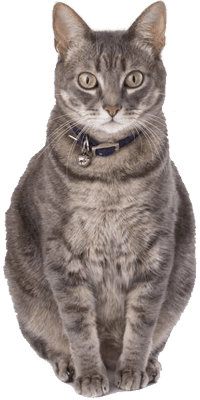Hyperthyroidism in Cats

What is hyperthyroidism in cats?
- Feline hyperthyroidism is a common disease in middle aged to older cats.
- It is caused by an enlarged and overactive thyroid gland(s) – usually a benign tumor that causes production of excessive thyroid hormone (T4).
- Signs of an overactive thyroid can include:
- Weight loss/muscle wasting
- Increased appetite
- Hyperexcitability
- Increased vocalization day or night
- Increased thirst and urination
- Vomiting and/or diarrhea
How does hyperthyroidism affect the heart?
Effects on the heart (thyrotoxic cardiomyopathy) may include:
- Rapid heart rate
- Abnormal heart rhythm
- Abnormal heart sounds (murmur +/gallop)
- Thickening of the heart muscle
- High blood pressure
- Congestive heart failure (fluid in or around the lungs)
How is it diagnosed?
- Physical exam findings may reveal an enlarged thyroid gland(s), thin body condition, abnormal heart sounds, poor coat quality, or muscle weakness.
- A blood test demonstrating a high T4 level( too much thyroid hormone) confirms the diagnosis.
- A small percentage of hyperthyroid cats will have a normal T4 level either because they are early in the disease process or because there is a concurrent illness suppressing the T4 level. In these cats, repeat measurement and/or other specialized thyroid hormone tests and/or imaging of the thyroid glands may be recommended to reach a diagnosis.
How do you treat hyperthyroidism in cats?
Treatment options include:
- Methimazole an oral medication that blocks the production of thyroid hormone. Some cats can be treated using this therapy as a lotion/gel absorbed through the skin.
- I-131 (radioactive iodine) treatment is used in both cats and people. This therapy entails giving the patient radioactive iodine which concentrates in and selectively destroys the overactive thyroid tissue/tumor.
- Diet: Hill’s pet food now offers a diet to treat cats with hyperthyroidism called Y/D diet. Iodine is an essential component of thyroid hormones. Hill’s Y/D diet is a severely iodine restricted food, thus preventing the thyroid glands from producing excessive thyroid hormone.
- Your primary care veterinarian will help determine the best course of therapy for your cat. The ideal treatment for each patient depends on the severity of the hyperthyroidism, concurrent illnesses (most importantly the heart and kidney), and the ability of your cat to be medicated. Our goal is open collaboration with you and your primary care veterinarian. Together, we develop individualized treatment to improve the quantity and quality of your feline companion’s life.
